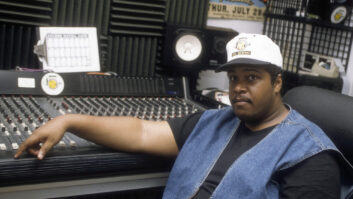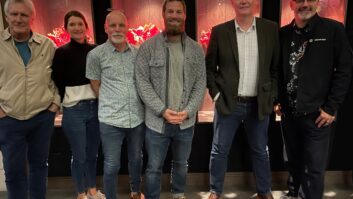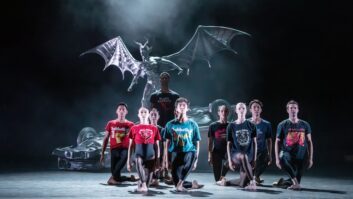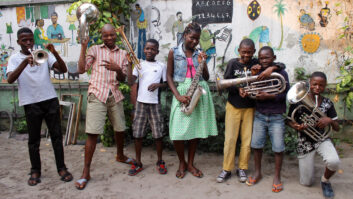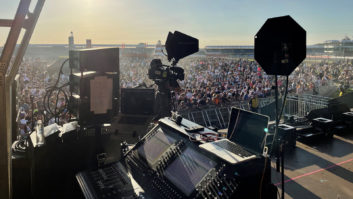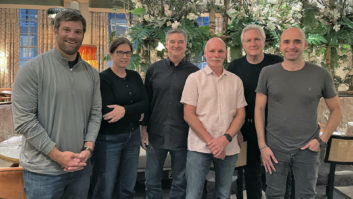United Kingdom (December 16, 2020)—Pink Floyd’s equipment and crew had a rebirth when Britannia Row Productions evolved from the band’s desire to tour less frequently. The company’s first premises in Islington was both warehouse and studio, so while the band concentrated on recording at its own pace, it set up a series of rental companies so that the crew could remain employed between tours. It could be said that the first Britannia Row production was for the band at Knebworth in the summer of 1975.

“I’m eternally grateful to Pink Floyd because this whole adventure started thanks to their foresight,” says Brit Row director, Bryan Grant, whose own story reads like a film script.
“I stumbled into the heady world of rock ‘n’ roll in 1971 whilst hanging out in New York with no particular purpose,” says New Zealander Grant. “A friend from back home was working for a PA company based in Manhattan and asked if I wanted to drive a van full of gear to North Carolina for a band. I had no idea where North Carolina was, had never driven a van before, nor driven on the right-hand side of the road… but of course I said yes!”
Following a few days of open-air gigs, he returned to New York and was offered a job with the sound supplier, The Megaphone Company. “I spent the next six months doing shows around the US for people like Miles Davis, Nina Simone and Richie Havens, picking up knowledge as I went. That’s how it worked in those days, I guess.”
After settling in London, Grant met future Brit Row co-director Mike Lowe in the early ‘70s. At the time, Grant was managing of IES (International Entertainers Services), the UK’s premier sound company (which had a loose trading arrangement with Clair Brothers at the time) and Lowe was touring with progressive rock band Emerson, Lake & Palmer, which became an IES touring client.
Lowe fondly remembers Pink Floyd as the soundtrack to his own early touring days in the 60s. “Almost a decade before Sony released the Walkman, I was accompanied in my touring days by a Sony cassette player which came with headphones for use in transit and a couple of light plastic speakers for use in hotel rooms. The two cassettes I played on repeat were Pink Floyd’s Dark Side of the Moon (1973) and Stevie Wonder’s Talking Book (1972).” Stevie Wonder would become one of Brit Row’s earliest success stories.
Grant had toured with Pink Floyd as the band’s advance man on its 1975 tour, but didn’t join Brit Row until 1979, forming Britannia Row Productions and eventually running the company with Pink Floyd’s audio manager, Robbie Williams. In 1984, the band decided it no longer wanted to be involved, so Grant and Williams bought the company from the group. Until this time, Brit Row had been a 360-service, but to move forward, Grant and Williams sold off the lighting equipment to focus exclusively on audio.
In 1987, Lowe joined the team and four years later, Williams sold his interest having set up his own production management company, RWP. The three remain close friends and, until Robbie’s retirement in 2014, collaborated on many successful events, culminating in the Diamond Jubilee of Elizabeth II.
Another early client of Brit Row was an up-and-coming band called The Cure. “I’m very proud and grateful that we continue to provide their sound today,” says Grant, who last watched Robert Smith’s post punk outfit perform at Austin City Limits in October 2019. “I think they’re still one of the best live bands in the world.”
Brit Row’s roster also includes Peter Gabriel, WOMAD and Cornbury Festivals, Foo Fighters, Swedish House Mafia, Chainsmokers, Harry Styles, Dua Lipa and Billie Eilish, as well as huge sporting events such as the FA Football, NFL and Major League Baseball.
Brit Row Brings Outline Newton to MTV Europe Awards
Today, following its 2017 acquisition, Brit Row is part of the Clair Global Group, and a new generation of management, promoted from within the company, is now in place.
Managing director Nicola Amoruso, who joined the company 12 years ago, reflects on his own journey with the sound institution.
“In my native Italy, Brit Row was the reference of a good rock ‘n’ roll company. Everybody talked about Brit Row as the company who did the job right. They were actually the only British company that had a reputation far beyond the UK. Without ever having toured here, I knew they were the goal to aim for.”
During the course of four decades of evolution, the company has welcomed different cultures, nationalities and perspectives. Amoruso continues, “Britannia Row has diversified culturally, and becoming a part of Clair Global is one of the strongest moves we’ve ever made. It not only benefits us, but our European experience now benefits non-EU companies, too. With the recent addition of Eighth Day Sound, further diversity of people and equipment has been added into the group.
“We’re a local company with global company thinking; we offer our clients deep regional knowledge from each of our worldwide locations. Our global coverage lessens the impact world touring can have on the environment as we are able to offer the same equipment and service throughout the world without asking productions to carry it to every continent.” Locations within the Group include Japan, Switzerland, Australia and sites across the US.
In the months before the pandemic, Brit Row had started work on some key installation projects—a first for the rental company. London’s Lafayette venue, the brainchild of another Brit Row client, Mumford & Sons’ Ben Lovett, will open in January.
Amoruso continues: “The formation of the Clair Group isn’t about just the bigger companies surviving. As a group of companies, we know it’s vital to keep the structure of the industry in place; we need a multi-layered ecosystem of smaller companies and venues. These are the best breeding grounds for new talent—it’s the starting point, the first breaks and learning experiences that create our industry’s most passionate people.”
Lowe can relate: “This is the business I wanted to be in from my early teens, although as a young roadie, I had no idea that that it would ever develop into a business, and certainly had no idea that I would end up running and owning companies! It has always been an exciting and invigorating journey and continues to be so today. Nearly two-thirds of my journey has been with Brit Row, where we have had and continue to have brilliant employees, freelancers, and customers and clients at all levels and sizes.”
As for the future, the trans-Atlantic relationships are its pathway forward. “Becoming a part of Clair Global has opened up many opportunities and, in return, I like to think that we have also enriched Clair Global,” says Lowe. “Even during this period, where the pandemic has wreaked havoc on the live events industry, every day is different and exciting, not only in dealing with the challenges that the pandemic has presented but spending the time on improving our infrastructure. Of course, there have been difficult, frustrating and challenging times—with 2020 being as difficult as it can get—yet there has never been a dull moment.”
Sales Director Lez Dwight has been at the forefront of the company’s pivot into new business in the UK, augmented by technical specialists Simon Hodge and Josh Lloyd, as these difficulties continue. Albeit it a world away from stadium rock shows, there have been some busy periods in recent months.
“This year has certainly presented an interesting dilemma to an audio hardware company like us,” says Dwight, acknowledging that physical challenges have been met with technological achievements. Amongst this lack of normality there’s been a record-breaking live stream with Dua Lipa’s Studio 2054 (which has garnered well over five million views), Billie Eilish’s incredible Where Do We Go? XR inspired stream – the first project on which Brit Row could join forces with both Clair and Eighth Day, and the Virtual Live Audience (VLA) system that, created by the Clair team in Lititz, took the UK team into broadcast TV territory.
Also moving into the remote / virtual realm is Britannia Row Productions Training, the company’s live audio engineering school which has been unable to trade since March. When Britannia Row Productions Training was awarded a Culture Recovery Grant as part of the UK Government’s plan to retain its key culturally significant businesses, the team looked at COVID-safe ways to ensure the industry can continue to learn. As a result, more than 140 educational videos will be delivered via a new online platform. Courses will be available from mid-January 2021, and for the first time, will enable international students to learn from home.
Lowe states: “The pandemic is causing shrinkage to the live events talent pool generally, although it is hard to quantify by how much. Training for young audio techs will have been on pause by at least 18-months by the time the industry is going to need them in abundance. Hopefully, by taking training online, it will go some way to bridge this gap.”
Financial director Christina Bosch has been dealing with employment furlough schemes and last-minute Government decisions — a full-time job. “Keeping staff together as much as possible while dealing with new announcements and looking at the best options financially has kept myself and the HR team very busy. Yet what has also been important is remembering the people at home, unable to undertake work while on furlough. We’ve helped people to train and stay engaged as much as possible, as that’s so important for morale,” she adds. “Redundancies, of course, create worry, but overall people are dealing with this year quite well. We’re expecting the industry to recover come spring / summer, and as the vaccine begins to roll out, real hope is finally here. We all need to remember this will take time, but we are cautiously optimistic.”
Britannia Row • https://www.britanniarow.com/
